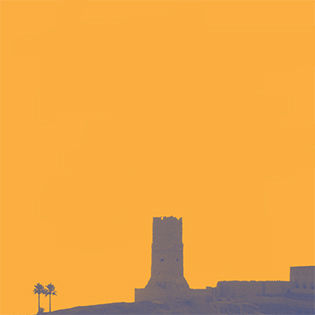Desert & Steppe Conquests: Fortresses and Railways in the Sahara and Kazakhstan
- Location
- Footprint Gallery, Jackfield Tile Museum, Salthouse Rd, Telford TF8 7LJ
- Dates
- Wednesday 14 September 2016 (19:30-20:30)
 Empires of Emptiness
Empires of Emptiness
Dr Berny Sèbe, University of Birmingham
How can empires expand into deserts, which by definition pose significant logistical challenges to any intruding force? How can technology compensate for the relative weakness induced by the conquerors’ limited knowledge of the human and physical geography of openly hostile spaces? From the Romans to the British, these two questions have remained pertinent when considering strategies of colonial expansion into arid spaces.
Conceived as a complement to the Empires of Emptiness exhibition held until 21 September at the Fusion Gallery (Jackfield Tile Museum), this talk will consider two major developments which allowed the expansion of European empires into the Sahara desert and the Central Asian steppe: desert fortifications and railways.
The use of fortresses in desert environments, as late modern empires started to come into contact with sparsely populated, and arid, areas, reflected clearly a strategy of symbolic assertion of sovereignty towards predominantly nomadic populations. At the same time, the practical benefits bestowed by secure strongholds able to shelter troops and supplies from potentially hostile forces were also significant, since they provided invading armies with useful intelligence-gathering bases, from where policing operations could be launched.
At the same time, the development of railway technology often changed profoundly the way in which colonial conquests in desert environments were envisaged. Whilst desert railways saw several success stories, from the re-conquest of the Sudan conceived by the Sirdar Kitchener from the outset as relying upon mechanized transport (1896-8) to the successful Trans-Aral railway (Moscow to Tashkent, 1900-6), in other cases plans for railway building remained chimeras. A case in point were French plans for a Trans-Saharan railway, which led to development of several missions (including one which was almost entirely massacred), but which never succeeded in linking up North and West Africa as was originally attended. However, the conquest of the Sahara itself was largely driven by the dream of a Trans-Saharan railway.
Comparing the case studies of French expansion into the Sahara desert, the British conquest of the Sudan and the development of the Russian empire in Central Asia, this talk explores the pivotal role played –in reality or in the public imagination- by fortresses and railways in the process of desert conquests in the nineteenth century.
Dr Berny Sèbe (D. Phil Oxon, FRGS, FRHS, FHEA) is a Senior Lecturer in Colonial and Postcolonial Studies at the University of Birmingham. He is the author of Heroic Imperialists in Africa: The Promotion of British and French Colonial Heroes (1870-1939)(Manchester University Press, 2013 and 2015) and the co-editor of Echoes of Empire: Memory, Identity and Colonial Legacies (IB Tauris, 2015). He is the principal investigator of the ‘Outposts of Conquest’ research project (www.birmingham.acuk/empires) , which has given rise to the Empires of Emptiness circulating exhibition (www.birmingham.ac.uk/forts).
More information: www.bernysebe.com